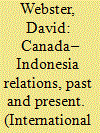| Srl | Item |
| 1 |
ID:
169209


|
|
|
|
|
| Summary/Abstract |
Canada–Indonesia relations recently passed their 65th anniversary, but they still have a tentative air about them. Despite regular talk about developing a strong Canadian relationship with a country that potentially has much in common with Canada, Canada–Indonesia relations have mostly been friendly but shallow. An overview of the history of bilateral relations, from the opening of a Canadian mission in 1953 to recent bilateral deals committing Ottawa and Jakarta to various forms of collaboration, reveals that rhetoric about common interests has some substance, but a new announcement amidst good intentions every few years is not likely to lead to any deep partnership. There are, however, foundations for closer ties in civil society, including in the fields of economic development, truth and reconciliation, religious deradicalization, and Indigenous peoples linkages.
|
|
|
|
|
|
|
|
|
|
|
|
|
|
|
|
| 2 |
ID:
115274


|
|
|
|
|
| Publication |
2012.
|
| Summary/Abstract |
Truth and reconciliation commissions (TRCs) have emerged as an international norm and are assumed to be an essential element of national reconciliation, democratization, and post-conflict development. Despite the increase in the number of TRCs being initiated around the globe and the international consensus regarding their positive effects, there is little understanding of the long-term effects and consequences of TRCs. Specifically, currently there are no established methods or mechanisms for measuring the impacts of TRCs; furthermore, the few examples of efforts to measure these impacts have serious limitations. This article explores both the rise in TRCs as an international norm and the contradictions and inadequacies in existing efforts to measure the impacts and successes of commissions. Through this examination, we aim to demonstrate the need for more critical, interactive, and inclusive mechanisms of assessment for understanding the effects of TRCs. The objective is neither to promote nor to criticize a specific TRC or TRCs in general; however, this article emphasizes the need to think rigorously about how we assess the effects of TRCs and offers insights into the value of more comprehensive mechanisms for assessing the impacts and local perceptions of commissions.
|
|
|
|
|
|
|
|
|
|
|
|
|
|
|
|